Come Dancing
19 November 1971
Perhaps unsurprisingly, ‘Kitten Kong’ wasn’t the only Goodies episode junked by the BBC. ‘Come Dancing’ also had its master tape wiped and, like a good number of Doctor Who stories from the 1960s, survived in an inferior recording format and largely through happenstance. One upshot of this is that it was omitted from the many and bountiful Goodies re-screenings on ABC TV, thus proving absent from my formative viewing years. I saw ‘Come Dancing’ for the first time in 2005 when it was released on the Goodies’ follow-up DVD compilation ‘At Last A Second Helping’.[1]
To be honest, I wasn’t all that impressed.
As I understand it, Series 2 of The Goodies was to have ended with ‘Kitten Kong’, but then a further six episodes were commissioned—in effect, a whole new season—and tacked onto the broadcast schedule. Did this strain the creative process? It’s hard not to believe so. Certainly the ‘bonus’ half of the series offers a step-down in quality from the original commissionings.
And the step-down from ‘Kitten Kong’ to ‘Come Dancing’? Well, it’s more like a flatlining; the kind of plummet as seen in ‘Rome Antics’ (and collaged for the opening credits of Series 6-8) when the lads doggedly follow the road to Rome through a 90° drop straight down. The ‘Complete LWT Series’ DVD compilation includes bonus feature footage of Tim judging a turkey competition. Well, as turkeys go, ‘Come Dancing’ is right up there.
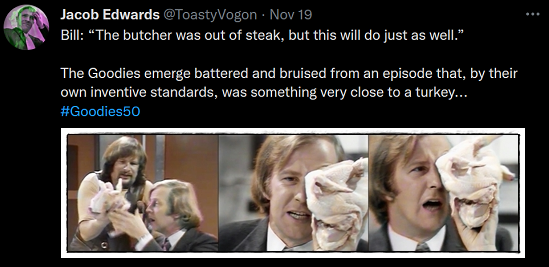
Shortcoming #1: It’s a single-joke concept. Unusually for the Goodies, there’s no real layering here, just the slightly tepid notion of transplanting sports fixing (specifically, boxing matches) onto the more salubrious world of ballroom dancing. That’s it. No twist, no biting commentary. No original music! And no great potential for laughs. Bill and Tim learning to dance seems poorly executed in light of the far better–realised conceptual reprise in Series 8’s ‘Saturday Night Grease’. Apart from that, the only real visual humour comes by way of the Goodies’ errant remote-controlled formal wear. The lads make the most of this but it’s still a poor return.
Shortcoming #2: The guest stars. Carry On actress Joan Sims plays gangster Delia Capone and is given no funny lines whatsoever. The joke—the only joke—is an extension of the main conceit; ie. that there are criminal elements operating behind the scenes of ballroom dancing competitions. To put it another way, the character is meant to be funny just because she exists, which doesn’t really hold water. Furthering the problem, Delia Capone is played (and presumably scripted) as an outrageous stereotype, not for any intrinsic value but so as to draw attention from the true, villainous nature of the second guest character, Penelope Fay (played by future Miss Marple, June Whitfield). Unfortunately, this holdback / reveal (when it comes) adds nothing funny to the mix! Not unlike Mollie Sugden’s Minister for Trade and Domestic Affairs from Series 1’s ‘Caught in the Act’, the characters are given little choice but to fall flat.[2]
Shortcoming #3: The lack of garnish. As mentioned in previous analyses, the Goodies were capable of sustaining an episode purely by way of comedic faffing about. In absence of true satire or spectacle, they could keep an audience chortling through physical capers, quick-fire exchanges, expectation gags and masterful delivery. ‘Come Dancing’ features a near dearth of these elements. Yes, there are the occasional little rib-ticklers, such as Tim’s pauseless ‘pardon’ when answering the phone (“Hello, Goodies here. We do anything anytime. Pardon?”) or his ensuing, over-the-top awe:
![[Dialogue]
Tim: "That was Penelope Fay!"
Bill / Graeme: "Penelope Fay!"
Goodies: "Who?!"](https://www.jacobedwards.id.au/wp-content/uploads/2021/11/15_Penelope-Fay.png)
Another highpoint comes with Graeme’s distracted-then-flustered performance (and subsequent realisation!) when he gives the game away to Delia Capone:
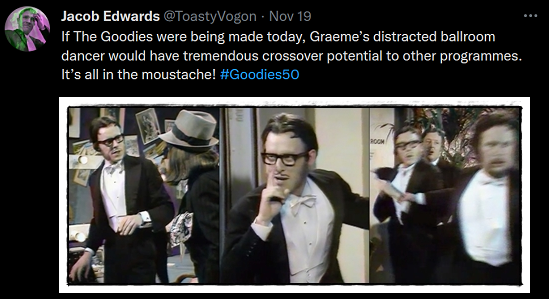
And there’s a modicum of mirth to be found in Tim and Bill’s interaction with the pre-recorded dance lesson (and Tim’s exclamation of, “I am the woman!”—though even this could do with more foreshadowing). But with these few exceptions ‘Come Dancing’ seems remarkably devoid of ‘Goodieness’.
As ever, some ideas would recrudesce: in later series, the Goodies themselves came to settle down in Cricklewood, here the home of ballroom dancing; their ‘three voices as one’ gag (“We are Cyril; we are a bank clerk”) was put to better effect three episodes later in the person of Reginald Wheelbarrow (he of the trifold moustache); and Graeme’s remote-controlled suits, turned against their users, would find a more riotous second coming in the form of black puddings. Finally, guest star Joan Sims would return in Series 3’s ‘Way Outward Bound’, delivering something far closer to a bravura performance.
All told, ‘Come Dancing’ feels rushed and unrefined—a shonky pastiche put out by the artist themselves! But it’s an outlier. No need to dwell.
Jacob Edwards, 19 November 2021
Tweets:
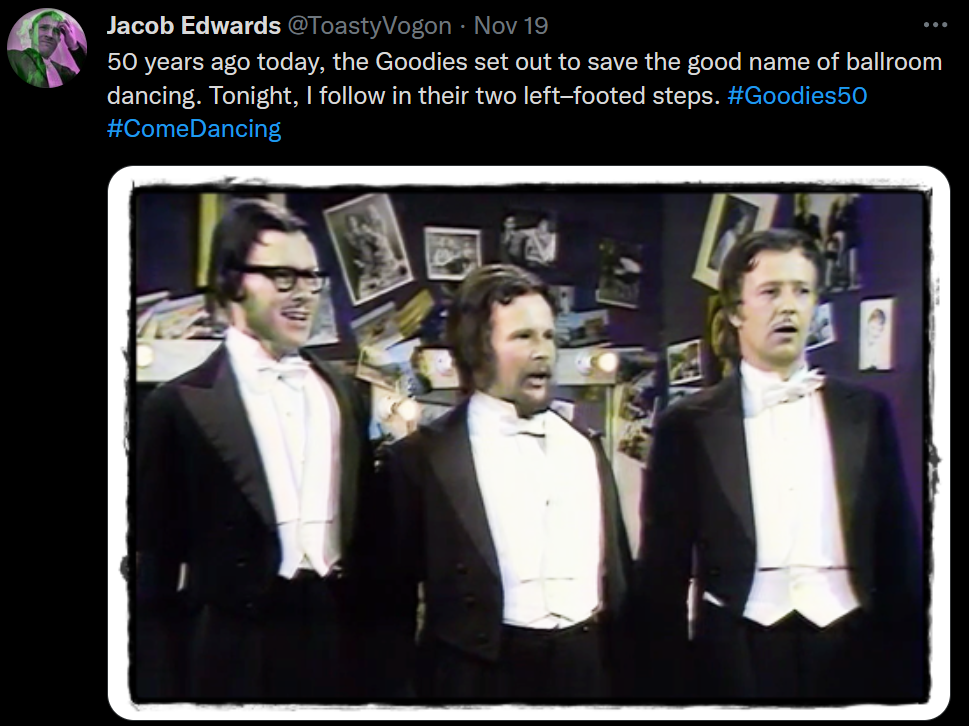
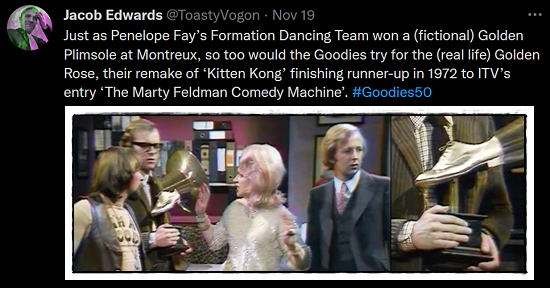
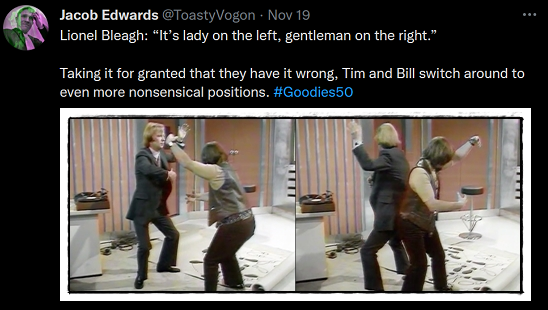
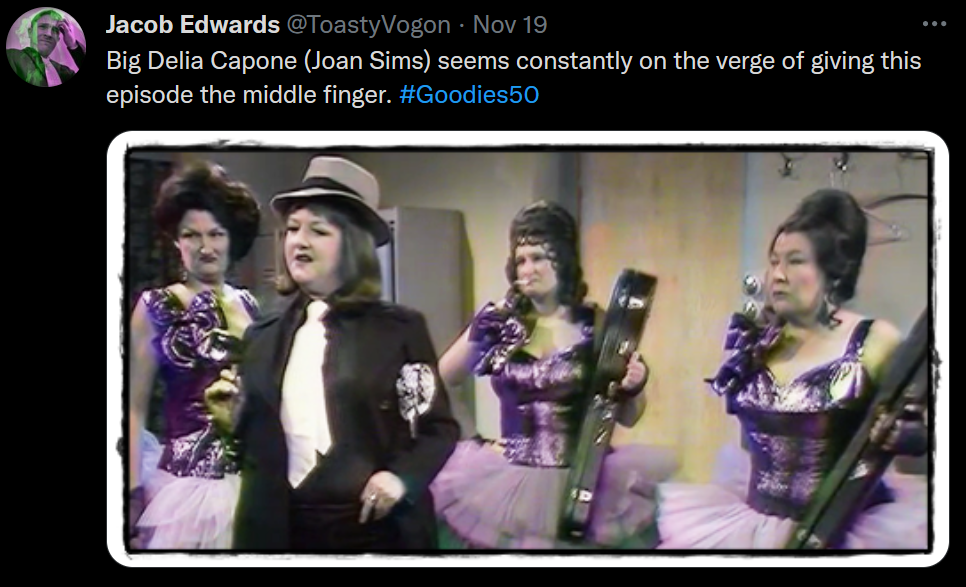
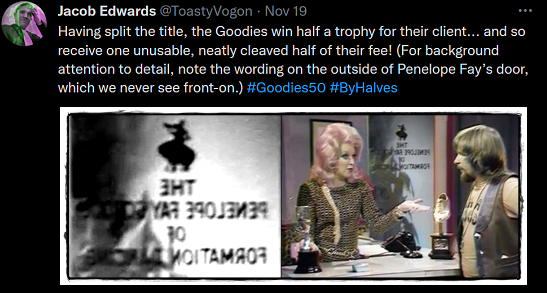
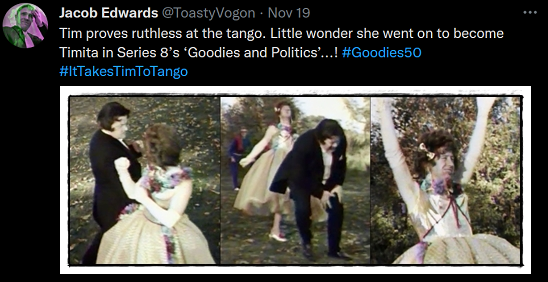
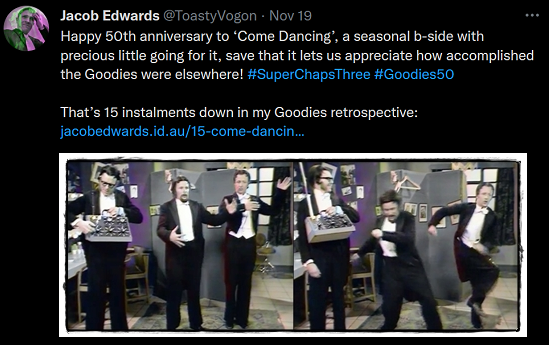
[1] Up until then, all I knew of the episode were two snippets: the postbox waltz and the lads dancing away from camera and exploding, as seen in the opening credits of Series 3-4 (with provenance as mystifying as that of the gymnasium scenes).
[2] Like Monty Python, the Goodies seemed more comfortable dressing up as women themselves than writing for female guest stars.
Previous: Kitten Kong
Next: Farm Fresh Food
